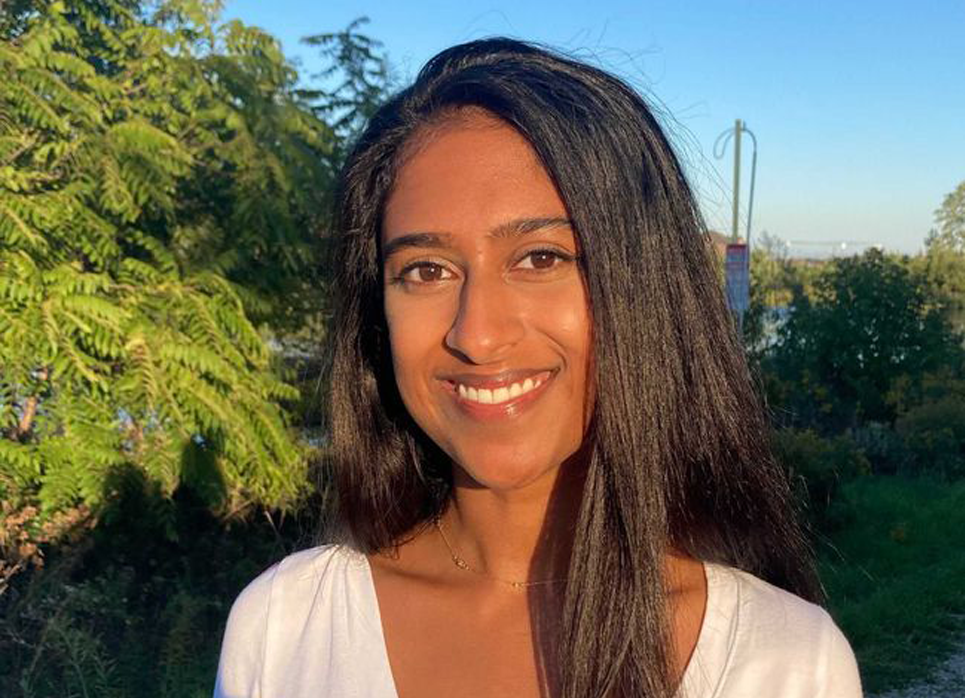Miranda Baksh: CEO of the Community Climate Council

Name:
Miranda Baksh
Age:
28
Occupation:
Educator and Activist
Name:
Miranda Baksh
Age:
28
Occupation:
Educator and Activist
My climate origin story:
Growing up, my parents and I would always go to our cottage with us. I was going there as a baby and literally grew up in the outdoors. I loved it, going to the cabin, gardening with my mom and always feeling inherently connected to outdoor spaces. I also cared very deeply about wildlife, thinking about the species been here for so much longer than we have and about why they evolved the way they did. But even though I knew that I loved animals, I didn’t know what career I wanted in highschool. I loved the sciences. I loved biology and chemistry, but they didn’t love me back. I then took a grade ten environmental science class and we were learning about chemicals in shampoos. I remember wondering why these weren’t being labeled as toxic, why we weren’t learning about unsafe things around us more. And as I realized how much work still needed to be done for the environment, I started thinking about environmental studies. I took environmental studies in undergrad and loved it. It was a great balance between policy, wildlife, conservation management and the social aspect of all these things. I loved it so much that I continued to pursue my Masters in Environmental Studies as well. During university, I had multiple different jobs. I was a French teacher at a private school but also an outdoor environmental educator. It really taught me how much I love educating, how much I love talking to community members and how much I, myself, learn through nature and educating others. But even though conservation was everything my heart wanted, my dream job, there was this looming consciousness that you can’t complete any conservation efforts without addressing climate change. Looking at how climate change impacts were affecting ecosystems and people is that really brought me into social justice. I realized that so many people around the world are suffering so much more than they should. I thought about my privilege as a Canadian settler and the injustices that were taking place around me. In short, that’s how my work and my interests shifted from wildlife conservation to climate change to climate justice. After my masters, I saw this program where they were looking for climate action catalysts to catalyze a solution in their community. That is where I met Sam, the other co-founder of the Climate Community Council. Looking back, I wouldn’t be in this current space if it wasn’t for all these little puzzle pieces and experiences coming together. They are all interconnected and brought me to where I presently am, where I recognize myself as an activist in some spaces and an educator in others.
What gives me the energy to keep going:
One thing is trying not to take on too many things. But another, bigger one, is just really trying to make time in your routine and finding the space to reflect, energize and take breaks. You need to know tat things won’t fall apart if you stop for a little bit. It’s okay to prioritize yourself. For a long time, it felt like there was just so much to fight for that I couldn’t afford to take some time for myself. You look at the news, you see entire communities flooding, you see the fires and heatwaves around the world or images of natural disasters. It can quickly feel like if you take a day off, the world is only going to fall apart more. But I had to learn that self-care is super important and that the world will not be falling apart if you take a break. In fact, you can’t help anyone if you fall apart. That’s how I keep going. I recharge, I’m outside in nature, I’m mindful of my time and my support system. Whether they’re family or friends, recognize that the moments you have with people around you are fleeting that you won’t always get again. Sometimes I get so caught up in my work, feeling like I’m doing the most important and urgent thing. But taking breaks is important, even organizationally. When the Climate Community Council went into hibernation, we stopped doing events and told everybody to log off. Burnout is so real, even on an organizational level. And as you see, we still exist right now, even after taking a break. We’re still doing the things we set out to do. We’re so used to the capitalist go, go, go that we forget to put ourselves first. But nature takes break, and so should we.
A piece of advice:
Climate change is a messy, wicked problem. That’s what scientists call it. And that means that it's super large and that it cannot be solved with one solution. It sounds very daunting that, if there's one issue here, it can impact so many different countries or different people elswhere. It just is a really interconnected problem. However, this also means that the solutions are interconnected. So if you have an interest or skills in the arts, for example, that is extremely powerful in solving the climate crisis. I think that it's not that obvious to people, but any and all skills that anyone has are truly needed. All hands on deck from all disciplines, all ages, all backgrounds, have to come together and solve it because it is a wicked problem. So to summarize, you absolutely don't need to have a science background or environmental background to get involved in the climate space. As long as you care, I think that is huge. You need compassion and empathy. If you care to see a better world, you're qualified, and there definitely is a way to integrate any of your skills into the climate movement because of how vast it is.